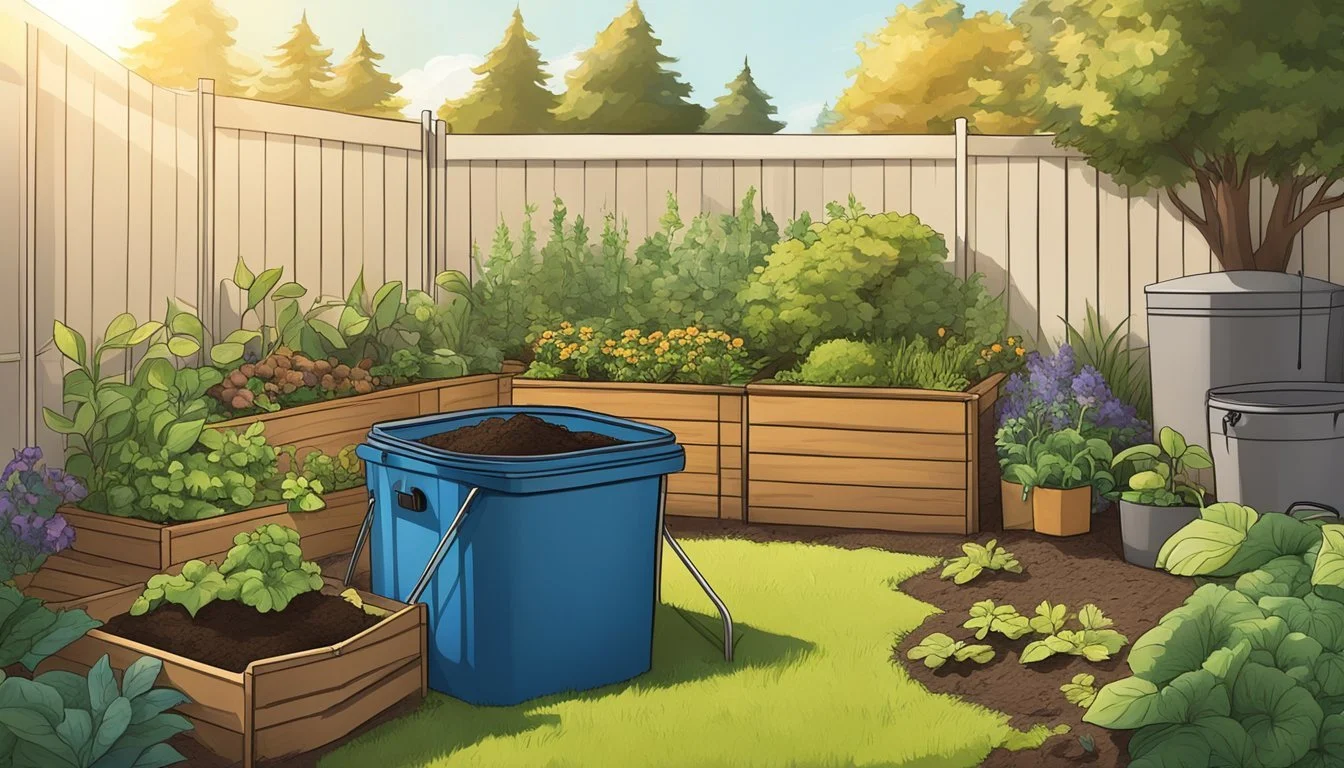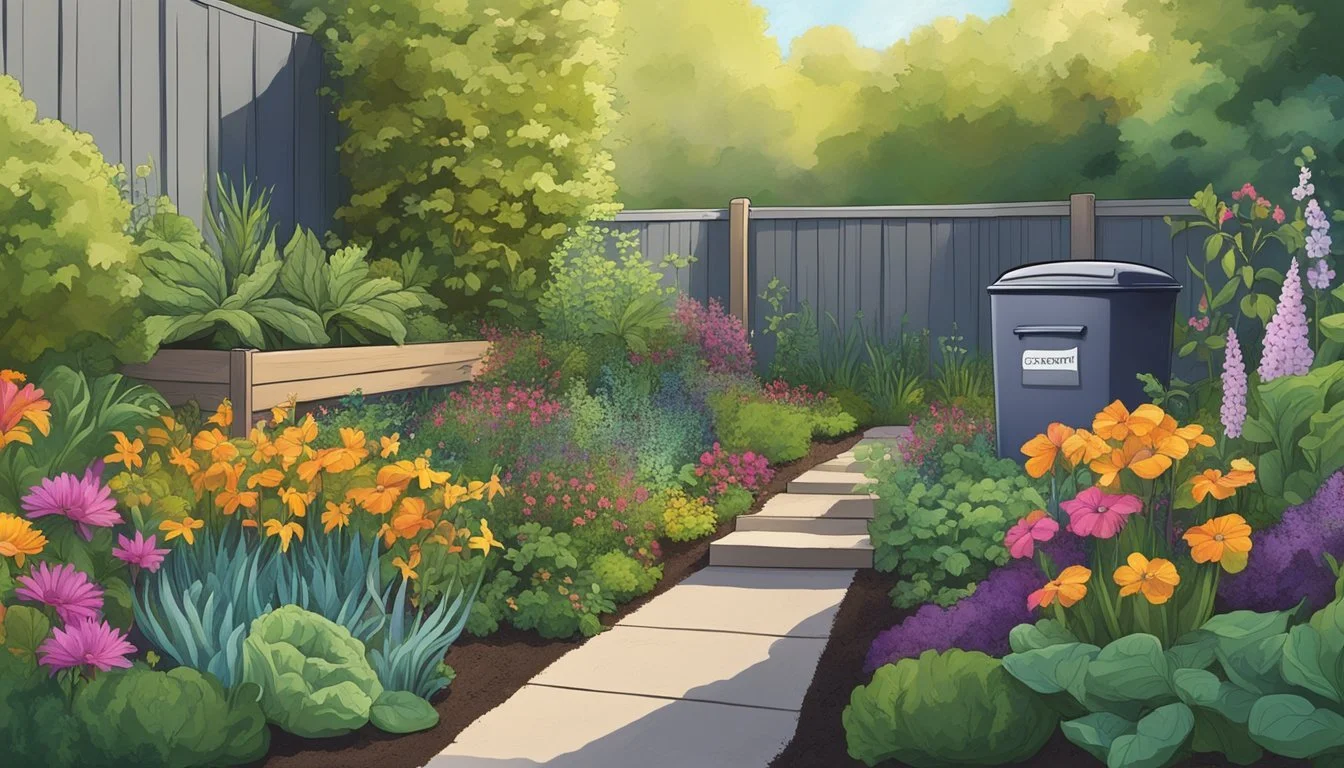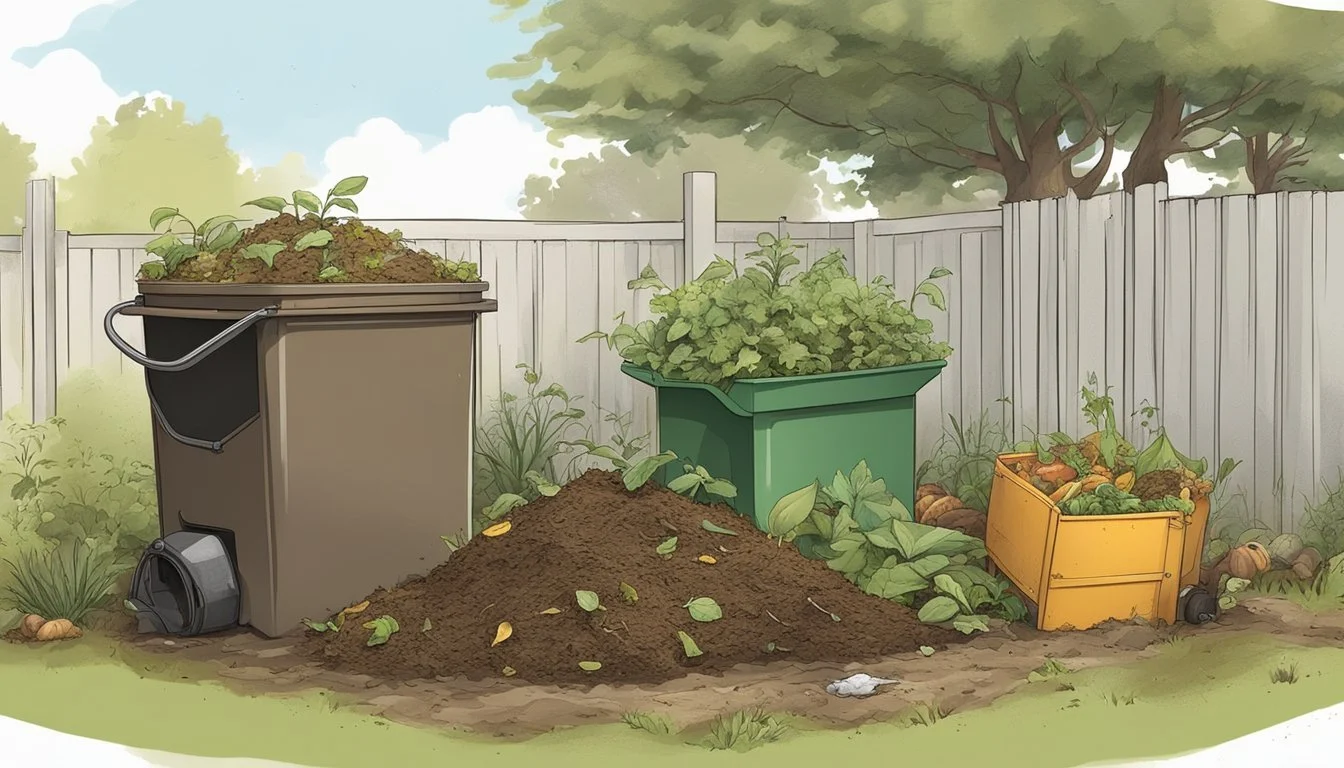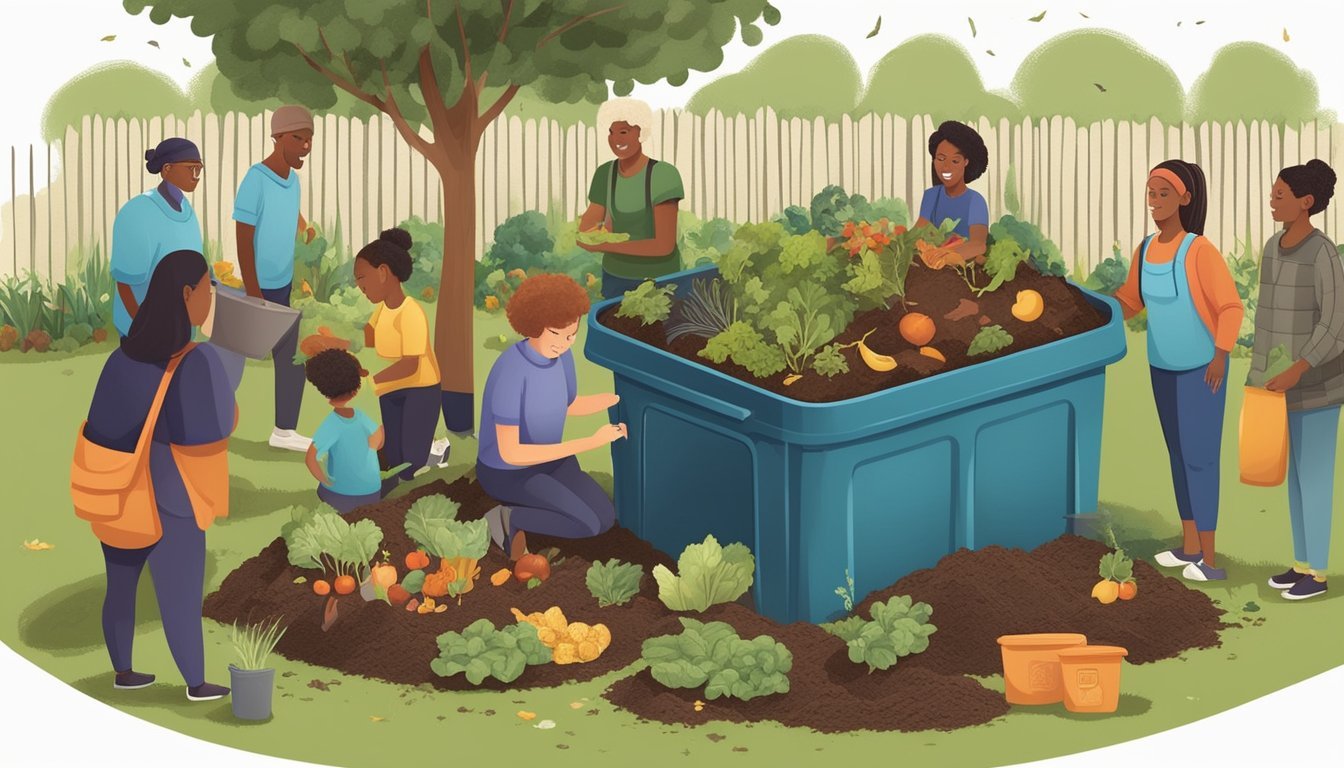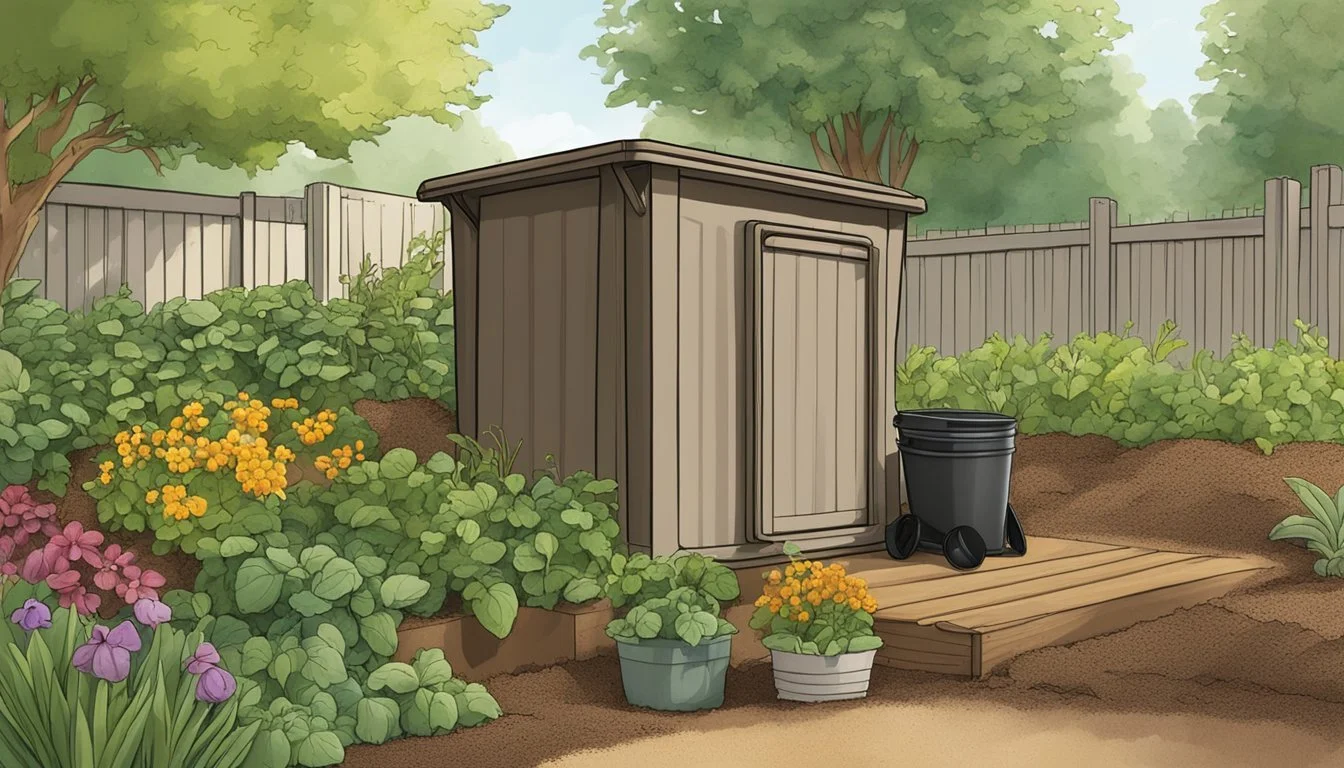Guide to Composting in Kent, WA
Essential Tips for Eco-Friendly Waste Reduction
Composting in Kent, WA, provides residents with an eco-friendly method to convert yard waste and organic material into valuable compost, enriching garden soil and reducing landfill waste. The process of composting naturally transforms leaves, twigs, and food scraps into a nutrient-rich soil amendment. In Kent, the local government and waste management services offer guidelines and support to ensure that composting is done efficiently and effectively.
Residents of Kent can leverage compost to enhance the growth of plants in their gardens by improving soil structure, water retention, and nutrient content. The City of Kent partners with services like Republic Services to facilitate the disposal of food and yard waste, which is then processed into compost rather than occupying space in a landfill. This initiative is part of a broader commitment to environmental stewardship and sustainable waste management.
Understanding the fundamentals of composting is key for Kent dwellers who want to contribute to a greener community. By composting the right materials and avoiding contaminants like plastic, individuals can create a successful composting system at home. In return, they gain a powerful tool for boosting their garden's health while supporting the city's efforts to manage waste responsibly. For more detailed guidance on composting practices, King County's resources offer extensive information on the topic.
Basics of Composting
Composting is an essential practice for recycling organic materials, enriching soil, and fostering sustainability. It transforms waste into a valuable resource for gardeners and plays a crucial role in reducing landfill usage.
What Is Composting?
Composting is the aerobic process by which microorganisms break down organic material such as leaves, twigs, and kitchen scraps, into a dark, nutrient-rich substance known as compost. This process transforms waste into beneficial soil conditioner, which provides numerous advantages for plant growth and soil health.
The Importance of Composting
Composting is vital for sustainability efforts because it minimizes the amount of waste sent to landfills. By doing so, it reduces methane emissions, a potent greenhouse gas, and recycles nutrients, promoting a closed-loop system within the ecosystem.
How Composting Benefits Your Garden
Soil Enhancement: Compost improves soil structure, which aids in water retention and aeration.
Nutrient Supply: It acts as a slow-release fertilizer, providing essential nutrients to plants.
Plant Health: Healthier plants are more robust against disease and pests.
Waste Reduction: Using kitchen and garden waste for composting can significantly reduce the amount of waste a household produces.
Composting offers a way to harness the value of organic material often considered waste, turning it into a valuable resource for gardeners and contributing to a more sustainable world.
Setting Up Your Compost System
Composting is a valuable way to recycle organic waste into rich soil for the garden. In Kent, WA, residents can adopt composting practices to manage yard waste and contribute to a greener environment.
Choosing the Right Location
The ideal spot for a compost bin is on level, well-drained ground. It should be easily accessible year-round, but not too close to living spaces to avoid any discomfort from odors. A location that receives partial sunlight can help to maintain optimal temperatures that facilitate faster decomposition.
Types of Compost Bins
Several types of compost bins can suit different needs:
Stationary bins are ideal for passive composting and can handle regular yard waste and kitchen scraps.
Tumblers offer an easy way to turn compost, which is crucial for aerating the mixture and speeding up the process.
Choosing the right type of compost bin depends on how much space one has and the volume of organic waste typically produced.
Building Your Own Compost Bin
For those who prefer a DIY approach:
Materials: Gather weather-resistant materials like cedar wood or recycled plastic.
Design: Ensure the bin is at least 3 feet wide and deep to generate enough heat for composting, with removable slats or a door to turn the compost.
Building a compost bin can be a cost-effective way to tailor a composting system to one's specific needs.
What to Compost
Composting in Kent, WA optimizes waste reduction by transforming various organic materials into beneficial soil amendments. As part of creating a successful compost, understanding what to include is crucial.
Green and Brown Materials
Composting requires a balance of green and brown materials to maintain proper carbon-to-nitrogen ratios.
Green materials provide nitrogen:
Food scraps: fruits, vegetables, coffee grounds, tea bags (without staples)
Grass clippings
Leaves: ensure they are not diseased
Plant cuttings
Brown materials supply carbon:
Cardboard and newspaper: shredded for better breakdown
Eggshells and nut shells: crushed to speed up decomposition
Hay and sawdust: avoid treated wood products
Items to Exclude from Compost
While composting can accommodate a wide variety of organic waste, certain items should be kept out to avoid creating odors, attracting pests, or introducing harmful pathogens and chemicals.
Meat, dairy, and bones: can attract pests and cause unpleasant odors
Tea and coffee bags: if they contain synthetic fibers or staples
Diseased plants: may spread pathogens within the compost
Colored or glossy paper: may contain heavy metals or other toxins
Hair: human or pet hair should be added sparingly as it can clump and slow down the composting process
Composting Techniques
Composting is an integral part of recycling organic matter into nutrient-rich soil amendments. Choosing the right composting technique can enhance the efficiency of the composting process and the quality of the compost produced.
Traditional Composting
Traditional composting involves compiling organic matter into a compost pile where it decomposes over time. The key to successful traditional composting is maintaining the right balance of carbon-rich materials such as leaves and paper with nitrogen-rich materials like food scraps and grass clippings. They initiate the breakdown process by microorganisms, gradually transforming waste into fertile compost.
Vermicomposting
Vermicomposting is a process that utilizes specific species of worms, commonly red wigglers, to accelerate composting. These worms consume organic waste, producing castings that are exceptionally nutrient-rich. Vermicomposting is especially suited for indoor composting and smaller scales, like in urban residences, because it is an odorless process and requires less space than traditional compost methods.
Hot and Cold Composting Methods
Hot composting is an active approach that speeds up the decomposition of organic matter. This method requires periodic turning of the compost pile to maintain high temperatures that quickly break down materials and kill off weed seeds and pathogens.
In contrast, cold composting is a more passive technique where organic matter is allowed to decompose over a longer period with minimal maintenance. Although it takes longer, typically a year or more, cold composting is a less labor-intensive method that still results in a valuable soil amendment.
Maintaining Your Compost
Maintaining your compost requires periodic attention to ensure it decomposes effectively. Proper aeration, moisture control, temperature monitoring, and regular turning are essential for a healthy composting process.
Aeration and Moisture Control
Compost needs oxygen to decompose organically. Compost piles should be fluffed to introduce air, which can be done using a garden fork or compost aerator. This helps prevent the material from becoming too compacted and anaerobic, which can cause foul odors. For moisture control, the compost should feel like a wrung-out sponge, moist but not dripping. If the compost is too dry, adding water will help to maintain the necessary moisture levels. Conversely, if it's too wet, integrating dry materials like straw or shredded newspaper can absorb excess moisture.
Monitoring Temperature and Odor
A compost pile's temperature is an indicator of the decomposing activity within. The center of the pile should be warm or hot; typically, a temperature range of 135-160 degrees Fahrenheit is ideal. If the compost pile is too cold, it may need more green materials, like food scraps and grass clippings, to heat up. If there is a persistent bad odor, it suggests an imbalance, often due to overwatering or lack of aeration, and might require more brown materials, such as leaves or cardboard, to restore balance.
Turning the Compost
Regularly turning your compost bin or pile is crucial for decomposition and odor control. It helps redistribute the heat and speeds up the composting process. The frequency of turning depends on several factors, including the size of the composting system and the season, but a general guideline is to turn the compost every 4-6 weeks. For those using a compost bin with a crank or tumbler mechanism, following the manufacturer's recommendations will usually suffice.
Using Your Compost
Once your compost has matured, it becomes a powerful tool to boost the health of your garden's soil. Applying compost not only enriches the soil but also provides a host of beneficial nutrients to plants.
When Is Compost Ready?
Compost maturity is indicated by a dark, crumbly texture and an earthy smell. One should expect mature compost to no longer have visible food or yard waste. Typically, the composting process can take anywhere from a few months to a year. To test if compost is ready for use, try the following:
Visual Inspection: The material should look uniform and dark.
Smell Test: The compost should smell like damp soil, without any pungent odors.
How to Use Compost in Your Garden
When introducing compost to your garden, a strategic approach maximizes the benefits for plant growth and soil health. Here's how to effectively incorporate compost:
As Soil Amendment:
Mix the compost into the top few inches of your garden soil to improve its structure and increase its nutrient content.
For Mulching:
Apply a layer of compost around plants to conserve moisture, suppress weeds, and slowly release nutrients into the soil.
Note: Over-applying compost can lead to nutrient imbalances, so a measured approach is best. Generally, a half-inch to two inches of compost is sufficient for most gardens.
By using compost in these ways, gardeners enrich the soil, providing a healthier environment for plants to thrive. This practice is beneficial not only in maintaining moisture and suppressing weeds but also in creating a nutrient-rich ecosystem within the garden.
Common Composting Problems and Solutions
As residents of Kent, WA tackle composting efforts, they often encounter several common challenges. This section provides practical solutions to help keep their composting process efficient and effective.
Composting Challenges
1. Not Enough Heat
If a compost bin or pile isn't heating up, it's likely due to a lack of nitrogen-rich materials. Adding more green waste, like vegetable scraps or grass clippings, will help increase the temperature and speed up decomposition.
2. Excessive Odor
A smelly compost pile is often the result of too many anaerobic processes, which occur when the pile becomes too wet and compressed. To resolve this, introduce more brown materials - such as dried leaves or shredded paper - to absorb excess moisture and add structure.
3. Presence of Inorganic Materials
Inorganic materials like plastics and metals disrupt the composting process and do not break down. These should be meticulously removed from the organic material to ensure a pure compost blend.
4. Attracting Pests
Sometimes, compost bins can attract rodents and flies. They are drawn to food scraps, particularly meats and dairy products which should not be added. It's recommended to stick to fruit and vegetable scraps, and ensure the bin is properly sealed.
Troubleshooting
Adjusting Moisture Levels
If the compost pile is too dry, the addition of water can help reactivate the composting process. Conversely, if it's too damp, adding more dry brown materials can restore balance and improve air circulation.
Turning The Compost
Turning the compost pile regularly is crucial for aeration and preventing compaction. This helps to provide the necessary oxygen for aerobic bacteria to thrive, facilitating the breakdown of organic material.
By addressing these common concerns, individuals in Kent, WA can maintain successful compost bins and piles, turning waste into valuable, nutrient-rich soil.
Composting and Community Involvement
In Kent, WA, composting efforts are strengthened through active community participation and educational initiatives that emphasize sustainability. These programs help to turn organic material into valuable resources for gardeners and landscapers while reducing yard waste.
Community Composting Programs
Community composting programs in Kent empower residents to contribute to a sustainable future by turning kitchen scraps and yard debris into nutrient-rich compost. These local programs source organic materials from the community and engage residents directly in the composting process. By providing tools and resources, including communal composting sites, the community actively participates in creating a closed-loop recycling system. Such programs are supported by the extensive guidance offered by entities like the Washington State Department of Ecology and the detailed information available from the King County CompostWise Guide.
Teaching Composting in Schools
Education is key to fostering a sustainable mindset among young people. As such, Kent's schools incorporate composting into their science curricula to teach students the value of recycling organic waste. Workshops and hands-on composting activities are designed to demonstrate the natural decomposition process and encourage students to take part in reducing food waste. The City of Kent further engages students by involving them in projects geared toward improving school gardens through compost application, thereby nurturing the next generation of environmentally responsible citizens. For comprehensive educational materials, the local community can utilize resources provided by Washington's Department of Ecology.
Composting and Sustainability
In Kent, WA, composting is not only an ecological strategy to manage waste but also a sustainable means to support the environmental health of the community.
Environmental Impact of Composting
The process of composting converts organic material like food scraps and yard trimmings into nutrient-rich soil amendments, which support plant growth and reduce the need for chemical fertilizers. Composting also plays a significant role in sustainability efforts by reducing greenhouse gas emissions. As organic waste decomposes in landfills, it produces methane, a potent greenhouse gas. Diverting these materials from landfills through composting can significantly lessen methane emissions.
Reducing Waste and Garbage Rates
By practicing recycling and composting, Kent residents can diminish the volume of waste sent to landfills. This helps to extend the lifespan of landfills and reduce garbage rates for the community. Composting can divert a substantial portion of a household’s waste stream, which predominantly comprises organic materials. Conversely, items such as plastic, metal, and animal products should be carefully sorted, as they may require different handling. Recycling properly and composting appropriate waste reduces the need for new garbage facilities and can lead to lower municipal waste management costs.




